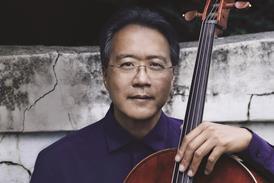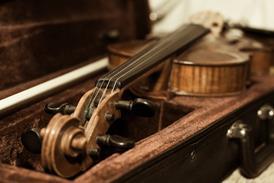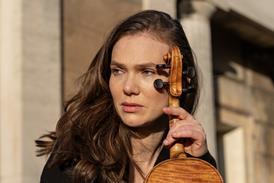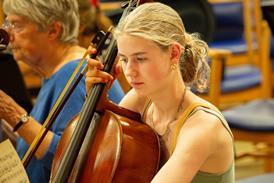Violinist Michel Schwalbé, who led the Berlin Phllharmonic
through most of the Karajan era, has died at the age of 92.
Born in 1919, in Radom, Poland, Schwalbé studied violin from the
age of eight with Moritz Frenkel in Warsaw. In 1933 he went to
Paris to study with George Enescu, and later with Jules Boucherit.
In 1940 Schwalbé fled Paris and settled in unoccupied Lyon, where
he became leader of the Orchestre Symphonique de France. He
remained there until 1942, when he was forced to escape to
Switzerland, hidden in a lorry loaded with furniture.
In 1944 Ernest Ansermet recruited him to become first concertmaster
of the Suisse Romande Orchestra in Geneva. Schwalbé performed as a
concerto soloist with the orchestra and internationally, and also
led the Geneva Trio and the Schwalbé Quartet. In 1946 he was
appointed as Joseph Szigeti's successor at the Geneva
Conservatoire.
In 1957 Karajan offered him the post of first concertmaster of the
Berlin Philharmonic. Schwalbé initially had doubts about leaving
Switzerland for Berlin, but as he explained in an interview for
The Strad in 2009, he was swayed by his admiration for
Karajan's 'brilliant talent' and an inner need for reconciliation:
'In spite of my experiences during the Nazi dictatorship, I had
already had many positive ones in post-war Germany. I wanted to
make a personal contribution to a mutual and heartfelt
understanding.'
Schwalbé led the Berlin Philharmonic until 1986. Shortly after
joining the orchestra, he was involved in the first of two
recordings of Strauss's Ein Heldenleben. At the first
rehearsal, his performance of the violin solo drew an ovation from
the orchestra. Schwalbé soon became famous for his interpretation,
and performed Ein Heldenleben over a hundred times all
over the world. But as he told The Strad, there was
another side to this success: 'While my colleagues went out to
explore new cities, I stayed at the hotel practising and worrying
about the evening's performance. The 'hero's life' could feel like
a hound's life, too!'
From 1963 he taught at the Hochschüle der Kunste (today's
Universität der Kunste) in Berlin, and after his retirement from
the Berlin Philharmonic he was much in demand as a jury member,
teacher and adviser to young players. He also conducted, giving
concerts in Japan, Poland, the Netherlands and the UK.
Schwalbé played on a 1709 Stradivari, the 'King Maximilan', from
1966 until the end of his career.
- News
- For Subscribers
- Student Hub
- Playing Hub
- Directory
- Lutherie
- Magazine
- Magazine archive
- Whether you're a player, maker, teacher or enthusiast, you'll find ideas and inspiration from leading artists, teachers and luthiers in our archive which features every issue published since January 2010 - available exclusively to subscribers. View the archive.
- Jobs
- Shop
- Podcast
- Contact us
- Subscribe
- School Subscription
- Competitions
- Reviews
- Debate
- Artists
- Accessories








































No comments yet